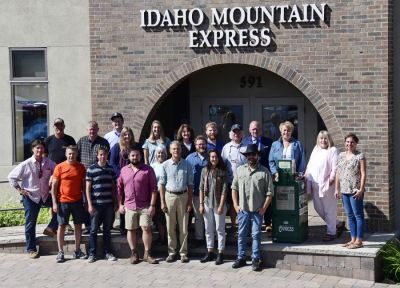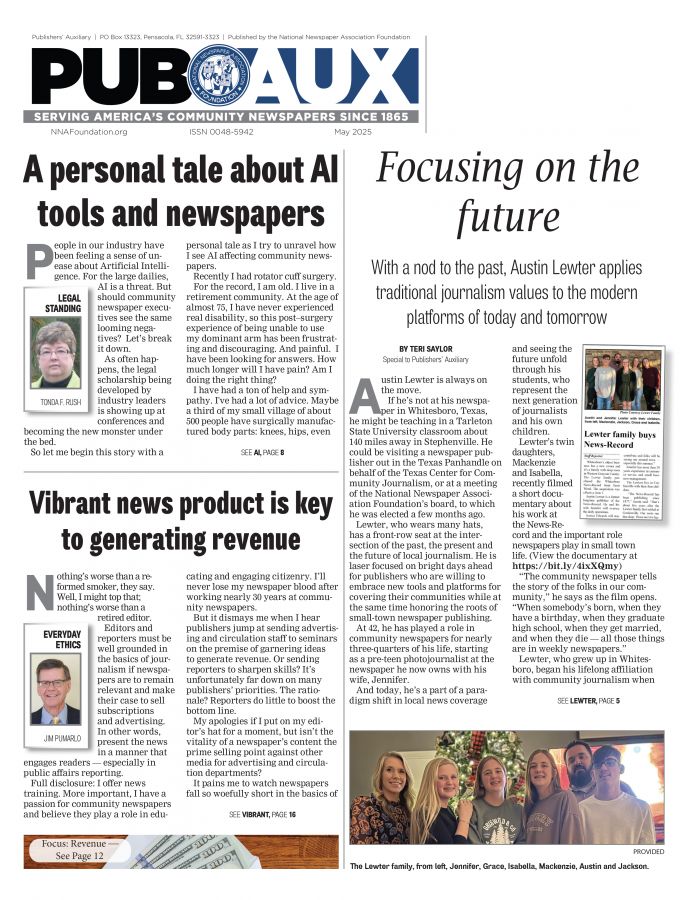Feisty Idaho Mountain Express thrives in tough environment
Teri Saylor
Special to Publishers' Auxiliary
Aug 1, 2019

The resort town of Ketchum, Idaho, has seen newspapers come and go, but the Idaho Mountain Express — established in 1974 to compete with an established local newspaper — is still standing strong.
“We are well-versed in newspaper competition,” said publisher Pam Morris, one of the newspaper’s eight owners, three of whom work at the newspaper. She attributes the newspaper’s success to the business model the owners established 50 years ago, its loyal readership, its feisty editorial voice and its blanket news coverage.
In a Skype interview with business manager and co-owner Connie Johnson, Morris describes the “get ’er done” attitude that has kept the Mountain Express surviving and thriving even in the toughest of times.
“We’ve always printed remotely,” Morris said. “You are looking at two women who used to drive the newspaper’s negatives two hours down the highway, get it printed and bring the printed paper back. We collated it by hand, and all of the employees distributed it to the post office, subscribers and news racks.”
That was back when there were only seven employees. Today, the paper’s staff is up to 25 full–time equivalents. The paper, which comes out on Wednesdays and Fridays, is printed by the Idaho Press Tribune in Nampa, about a three-hour drive away. The pages travel to the Tribune electronically, and the printed issues are delivered back to Ketchum.
Johnson got her start at the Mountain Express years ago when she answered an ad calling for a typist — “weird hours, good pay,” she recalled. “I answered the ad and did that work for a year.”
When Johnson was promoted to business manager, the newspaper ran the same help-wanted ad, and Morris answered it.
“I got the job, and the rest is history,” she said.
Ketchum is an affluent town in the Wood River Valley, best known for its proximity to the popular Sun Valley Ski Resort. Both are situated in Blaine County. It is a mecca for the arts, and one of its crown jewels is the Sun Valley Pavilion — a large outdoor concert venue that hosts dozens of artists every year.
In the early 1880s, Ketchum was a booming mining town, but by the Great Depression, the mining boom had ended, and it was left nearly a ghost town. Then Union Pacific Railroad chairman Averell Harriman selected that valley to build Sun Valley, creating the first destination ski resort in the United States. Today, Sun Valley Resort is privately owned by the R. Earl Holding family, owners of Sinclair Oil Corporation.
Blaine County is also home to the towns of Hailey and Bellevue. The Mountain Express covers those towns, too.
Newspapers are getting a bad rap these days, but in Blaine County, readers appreciate the Mountain Express, according to Morris.
“I have more people walking up to me in this stage of my career saying, ‘We love the newspaper, and we want to thank you for doing such a great job for this community,’” she said. “It happens nearly daily, and it is amazing and gratifying.”
Politically, Idaho is a largely red state, except for Blaine County, which is more progressive.
“Our county is the only county in Idaho that has voted for the Democratic candidate in recent Presidential elections,” Morris said. “We’re a little blue island in a sea of red.”
Ketchum is on the edge of the Sawtooth Wilderness, a federally protected area that covers 217,088 acres in Idaho. The Mountain Express editorializes for higher density in local communities and for preserving the wide-open spaces outdoors, including a “no hillside building” ordinance to preserve the natural beauty of the local mountains. The newspaper has also fought against zoning for big box stores and strip malls and strongly supported environmental protection.
“We are not wallflowers,” Morris said. “We have editorially supported funding for education, and we tell people, ‘If you disagree, that’s fine. Write a letter to the editor or comment online.’”
She hopes the newspaper’s news coverage and editorial stance on issues will inspire readers to attend city council or county government meetings and believes the county has a more engaged public than others because of the newspaper’s coverage.
“It gives me heartburn when I see newspapers backing off from having an editorial page of any kind,” she said.
The staff is not above doing whatever it takes to get the newspaper out, despite deep snowfalls and wildfires that threaten their communities. During a fire that threatened Ketchum, the newspaper commandeered a small printing press and published updates daily.
“People really needed it,” Morris said. “They needed to see a map; they needed to hear first–hand from the fire commanders what was going on and whether they needed to evacuate.”
During a recent wildfire that threatened the town of Hailey, road closures hampered entrances and exits in the valley. The staff moved the newspaper’s entire operation into a barn on Johnson’s property nearby.
“It was so hot. No air conditioning,” Johnson said. “My husband and son-in-law had to cut an opening in the roof to let the hot air out.”
In both disasters, the newspaper never missed an issue.
The Mountain Express, which covers a county population of more than 22,000, distributes 12,500 on Wednesdays and 10,000 on Fridays. Circulation is a combination of free distribution on newsstands and paid subscriptions. While the newspaper still derives most of its revenue from its print product, its website — on the TownNews platform — is lively and free of charge, but Morris is considering installing a paywall. Currently, the site receives 60,000 unique visits per month.
There are eight reporters and editors and an advertising sales force of six, including an advertising administrator. Two employees work in classifieds and serve as receptionists.
Morris, who serves as the advertising director, has a strong sales ethic.
“Our ad base is made up of local businesses, and the sales team tells their clients that being a part of the newspaper is essential to being a part of the community,” she said. “People still like to shop, eat out and attend events. We are the best and most cost-effective way for our local businesses to get their messages out there.”
Morris keeps her sales team motivated by constantly reminding them why the newspaper must stay healthy and strong.
“You must have a really strong advertising staff that believes in what they are doing and believes in the role newspapers play in Democracy,” she said. “Our sales staff understands that this is not about just earning a commission, but they must have a sense of the larger mission, otherwise, they can’t sell the newspaper successfully.”
Classifieds are also strong, with a pricing model that is a blend of paid and free. Ads selling items for more than $1,000 are paid. Anything advertised for sale under $1,000 is free. A special classified category called “miscellany 2” drives readers to that section.
“Miscellany 2 is like a personals column. People can submit them through our regular classified portal, and they can be anonymous,” Morris said. “I review the ads, and you should see the ones we can’t print.”
Public notice advertising continues to be a strong part of the newspaper’s revenue. The staff publishes a public notice insert with a summary of the notices in the news pages. Johnson keeps her eye trained on the public notices for story ideas, too.
“We list them by title in the news section, and people go find the ones they want to read in the public notice section,” Morris said. Public notices also run on the Idaho Press Association’s website.
What does the future look like for the Mountain Express and other local newspapers?
“We’d like to know that, too,” Morris said. “For now, we’re just going to keep going, stick to our knitting, stick to our news franchise and see where that takes us.”
For readers, the newspaper is one-stop shopping with everything they need to know concentrated in one place. Morris says anyone who goes online to find out what is going on is wasting their time.
“We have curated our news and our advertising. In our paper, you don’t have to wait for them to pop up, and you don’t have to go and search for them,” she said. “It’s a far more efficient way to find out what you need to know. Our search engine is already optimized.”
Teri Saylor is a freelance writer in Raleigh, North Carolina. Contact her at 919-604-0288.









